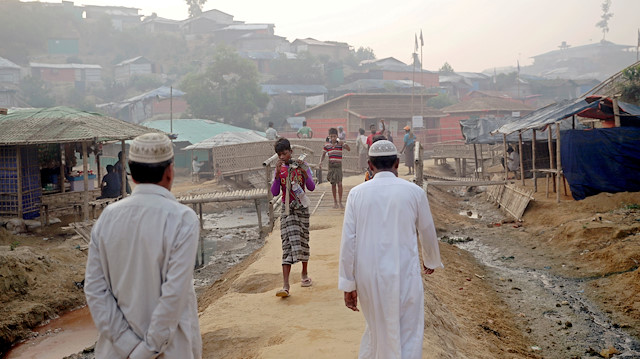

File photo
Dhaka rejects claims by Myanmar official that 2 Rohingya men who have contracted COVID-19 returned from Bangladesh
Bangladesh and Myanmar are at odds over the origin of two coronavirus cases confirmed among the latter’s Rohingya community.
The dispute started when Myanmar’s Health Ministry confirmed that two Rohingya men -- a Muslim and a Hindu -- had tested positive for COVID-19 in the country.
Some media outlets in Myanmar, citing local lawmakers, reported that both men had recently returned from the refugee camps in Cox’s Bazar in southern Bangladesh, home to more than 1 million Rohingya refugees.
However, on Tuesday, Dhaka rejected the reports as “totally false and baseless.”
Mahbub Alam Talukder, Bangladesh's commissioner for refugees, relief, and repatriation, said the claim was a continuation of Myanmar’s “fabricated speeches.”
“This is completely wrong and inaccurate information. No Rohingya has returned to Myanmar from Bangladesh in the past few years,” he told Anadolu Agency.
He said such a journey would be particularly hard right now due to the coronavirus restrictions imposed in Rohingya camps.
“It’s quite impossible for any Rohingya person to go from Bangladesh to Myanmar amid the virus restrictions,” said Talukder.
On June 4, Myanmar said a Rohingya man who tested positive for COVID-19 was admitted to a hospital in Maungdaw, a town near its western border with Bangladesh.
Soe Aung, district administrator for Maungdaw, said the 38-year-old patient was among five Rohingya people who returned to Rakhine state from Bangladesh on May 30, according to local online website Narinjara.
Then, late on Monday, the Health Ministry said a 25-year-old Rohingya Hindu man was confirmed to have contracted COVID-19.
“Villagers said he arrived alone on June 3. Some people who have come into contact with him have also been shifted to a quarantine site for 21 days,” Aung told Anadolu Agency on Tuesday.
Myanmar has a total of 244 cases, including six deaths and 159 recoveries, while Bangladesh’s overall count is at 71,675, with 975 deaths and over 15,300 recoveries.
According to Amnesty International, more than 750,000 Rohingya refugees, mostly women and children, crossed into Bangladesh after Myanmar forces launched a brutal crackdown on the minority Muslim community in August 2017, bringing the number of the persecuted people in Bangladesh to above 1.2 million.
Although a plan to repatriate Rohingya refugees has stalled, Myanmar in April claimed that more than 600 Rohingya had returned from Bangladesh of their own volition.
In a statement last week, Bangladesh’s Foreign Minister A K Abdul Momen accused Myanmar of not accepting a single Rohingya person in the last three years since the community’s August 2017 exodus.
*Kyaw Ye Lynn from Myanmar contributed to this story
#Bangladesh
#Coronavirus
#COVID-19
#Hindus
#Muslims
#Myanmar
#refugee
#Rohingya

